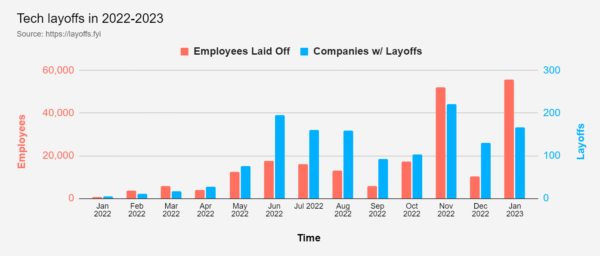The tech sector has started embarking on widescale job layoffs, which is as unfortunate as it is completely expected.
Congrats! There’s a good chance that you’ve been laid off recently.
This is especially true in the tech sector, where, according to CNBC, 150,000 tech workers lost their jobs in 2022.
I have lots of compassion for those who have been laid off. It’s happened to me before, and after considerable review, I can’t say I recommend it.
That said, it’s hard for me to stay full of compassion when I read articles about how Gen Z’ers are looking at their first tech layoffs, with quotes in the New York Times from recently laid-off workers saying things like “It seemed like tech companies had so much opportunity. If you got a job, you made it. It was a sustainable path.”
You must be new here.
If this is your first time getting laid off, then I imagine it’s like the first time you’ve had someone break up with you, a realization that something happened that you didn’t think was possible.
But take heart, if you’ve just been laid off, you’re in good company. And if you haven’t been laid off, well, get ready to start packing.
Table of Contents
Layoffs are coming
There’s a great website called layoffs.fyi, that has all sorts of nifty charts documenting the current and upcoming employment carnage.
Just look at this particular chart of woe, showing the number of employees let go, as well as the number of companies that had layoffs, over the past year:

Here’s a short list of some big companies and the number of recent layoffs to date at each one:
- Alphabet (Google): 12,000
- Amazon: 18,000
- Microsoft: 10,000
- Meta: 11,000
And these are just the big companies. As you can see from the chart above, many companies are laying off workers.
Why is this happening?
As always when it comes to the tech sector, it’s hubris and shortsightedness that are to blame.
When the pandemic hit, some technology companies saw the changing landscape and believed that they needed to hire like crazy.
And in truth, there were some companies that did have a huge crunch all of a sudden. Zoom was just another small screen sharing app company before it became the de facto Way That Everyone Communicated from 2020 on. They needed people immediately, and not just to fix how their platform was fundamentally insecure.
The pandemic, supply chain disruptions, and even people having more discretionary income (thanks to federal stimulus) meant that people were buying tech all over the place.
Valuations soared. Companies that weren’t tech companies (like co-working-upstart-turned-liability WeWork) decided to pretend that they were tech companies, and their stock prices exploded accordingly.
Meanwhile, no one at any level of the sector appears to have wondered if all of this was sustainable.
And, shockingly, it wasn’t.
Tech companies suck at hiring
I’ve spent a good portion of my working life at tech companies, so I have a bit more of an insight into them than, say, grocery stores.
But in my experience, tech companies appear to be able to see no more than three to six months in advance, tops.
When there’s even a little bit of funding available, tech companies tend to go crazy and hire people as if it were a game of Supermarket Sweep. And then, when this wild unheard-of black swan event called a “market downturn” happens, they shed many of those people that they shouldn’t have brought on in the first place.
A few years back, I worked for a company that in a year’s time had ballooned from 300 to 1,200 people. This was during a bull market, sure, but a 400% increase in headcount in a year? There’s absolutely no way that you can set up all of these people for success. There’s no one to even train them, let alone help them assimilate to a new culture.
And when that bull market turned around, they laid off hundreds of those people, many of whom that they shouldn’t have hired in the first place, but also jettisoning quality dedicated performers in their push to “become more focused on driving revenue”. As if that’s something that they just remembered they needed to do.
(Also, a lot of smaller tech companies, don’t actually have a viable business model, something that it’s been possible to hide until recently.)
It’s all very disappointing, and if you’ve been swept up in the downsizing, it can feel truly unfair.
And if you’re a little bit vengeful, just remember that, according to a recent survey, 1 in 4 technology companies don’t think they’ll be able to survive more than a year-long recession. So your company may not be around long anyway. Be glad you got out when you did.
What to do now
I’ve long said that the best time to prepare for a job loss is when you have a job. But I recognize that not everyone takes that to heart, especially if you thought that your tech job would be 100% stable.
Luckily, I’ve got a readiness plan for you that you can take up today. What you do in the weeks and months after your job loss are critical to your ongoing financial wellness.
I apologize to some younger folks if it sounds I’m lecturing, but I’ve been through this before.


